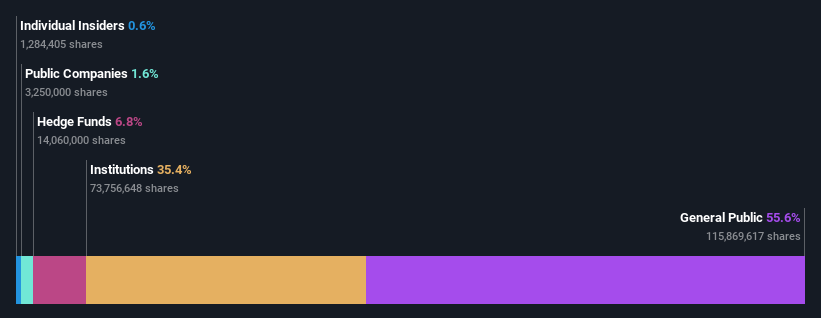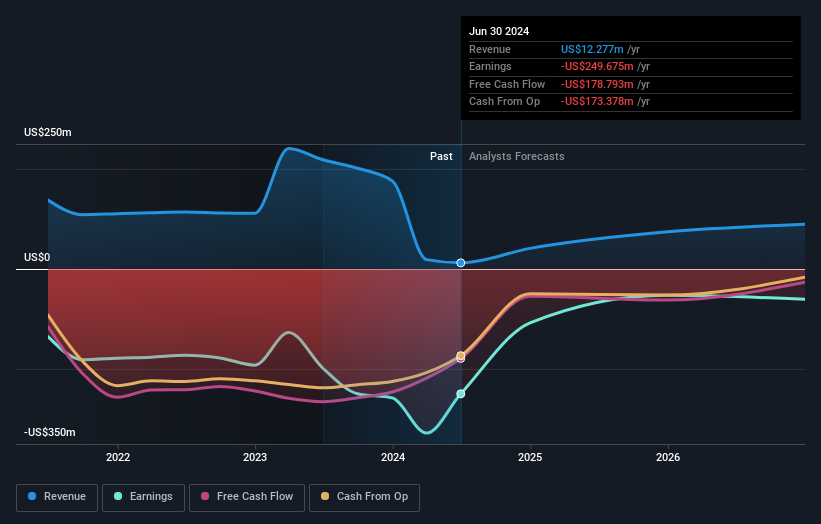- United States
- /
- Biotech
- /
- NasdaqGS:SGMO
Retail investors who hold 56% of Sangamo Therapeutics, Inc. (NASDAQ:SGMO) gained 13%, institutions profited as well

Key Insights
- Significant control over Sangamo Therapeutics by retail investors implies that the general public has more power to influence management and governance-related decisions
- The top 25 shareholders own 40% of the company
- 35% of Sangamo Therapeutics is held by Institutions
If you want to know who really controls Sangamo Therapeutics, Inc. (NASDAQ:SGMO), then you'll have to look at the makeup of its share registry. And the group that holds the biggest piece of the pie are retail investors with 56% ownership. Put another way, the group faces the maximum upside potential (or downside risk).
Following a 13% increase in the stock price last week, retail investors profited the most, but institutions who own 35% stock also stood to gain from the increase.
Let's take a closer look to see what the different types of shareholders can tell us about Sangamo Therapeutics.
View our latest analysis for Sangamo Therapeutics

What Does The Institutional Ownership Tell Us About Sangamo Therapeutics?
Institutions typically measure themselves against a benchmark when reporting to their own investors, so they often become more enthusiastic about a stock once it's included in a major index. We would expect most companies to have some institutions on the register, especially if they are growing.
Sangamo Therapeutics already has institutions on the share registry. Indeed, they own a respectable stake in the company. This can indicate that the company has a certain degree of credibility in the investment community. However, it is best to be wary of relying on the supposed validation that comes with institutional investors. They too, get it wrong sometimes. It is not uncommon to see a big share price drop if two large institutional investors try to sell out of a stock at the same time. So it is worth checking the past earnings trajectory of Sangamo Therapeutics, (below). Of course, keep in mind that there are other factors to consider, too.

It would appear that 6.8% of Sangamo Therapeutics shares are controlled by hedge funds. That catches my attention because hedge funds sometimes try to influence management, or bring about changes that will create near term value for shareholders. Our data shows that Wasatch Advisors LP is the largest shareholder with 9.6% of shares outstanding. Meanwhile, the second and third largest shareholders, hold 6.8% and 5.7%, of the shares outstanding, respectively.
On studying our ownership data, we found that 25 of the top shareholders collectively own less than 50% of the share register, implying that no single individual has a majority interest.
While studying institutional ownership for a company can add value to your research, it is also a good practice to research analyst recommendations to get a deeper understand of a stock's expected performance. Quite a few analysts cover the stock, so you could look into forecast growth quite easily.
Insider Ownership Of Sangamo Therapeutics
While the precise definition of an insider can be subjective, almost everyone considers board members to be insiders. Management ultimately answers to the board. However, it is not uncommon for managers to be executive board members, especially if they are a founder or the CEO.
Most consider insider ownership a positive because it can indicate the board is well aligned with other shareholders. However, on some occasions too much power is concentrated within this group.
Our data suggests that insiders own under 1% of Sangamo Therapeutics, Inc. in their own names. It appears that the board holds about US$1.2m worth of stock. This compares to a market capitalization of US$187m. Many investors in smaller companies prefer to see the board more heavily invested. You can click here to see if those insiders have been buying or selling.
General Public Ownership
The general public, who are usually individual investors, hold a substantial 56% stake in Sangamo Therapeutics, suggesting it is a fairly popular stock. With this amount of ownership, retail investors can collectively play a role in decisions that affect shareholder returns, such as dividend policies and the appointment of directors. They can also exercise the power to vote on acquisitions or mergers that may not improve profitability.
Next Steps:
While it is well worth considering the different groups that own a company, there are other factors that are even more important. Like risks, for instance. Every company has them, and we've spotted 4 warning signs for Sangamo Therapeutics (of which 2 make us uncomfortable!) you should know about.
Ultimately the future is most important. You can access this free report on analyst forecasts for the company.
NB: Figures in this article are calculated using data from the last twelve months, which refer to the 12-month period ending on the last date of the month the financial statement is dated. This may not be consistent with full year annual report figures.
New: Manage All Your Stock Portfolios in One Place
We've created the ultimate portfolio companion for stock investors, and it's free.
• Connect an unlimited number of Portfolios and see your total in one currency
• Be alerted to new Warning Signs or Risks via email or mobile
• Track the Fair Value of your stocks
Have feedback on this article? Concerned about the content? Get in touch with us directly. Alternatively, email editorial-team (at) simplywallst.com.
This article by Simply Wall St is general in nature. We provide commentary based on historical data and analyst forecasts only using an unbiased methodology and our articles are not intended to be financial advice. It does not constitute a recommendation to buy or sell any stock, and does not take account of your objectives, or your financial situation. We aim to bring you long-term focused analysis driven by fundamental data. Note that our analysis may not factor in the latest price-sensitive company announcements or qualitative material. Simply Wall St has no position in any stocks mentioned.
About NasdaqGS:SGMO
Sangamo Therapeutics
A clinical-stage genomic medicine company, focuses on translating science into medicines that transform the lives of patients and families afflicted with serious diseases in the United States.
Adequate balance sheet slight.


